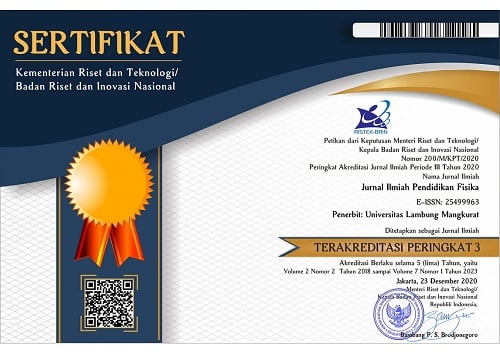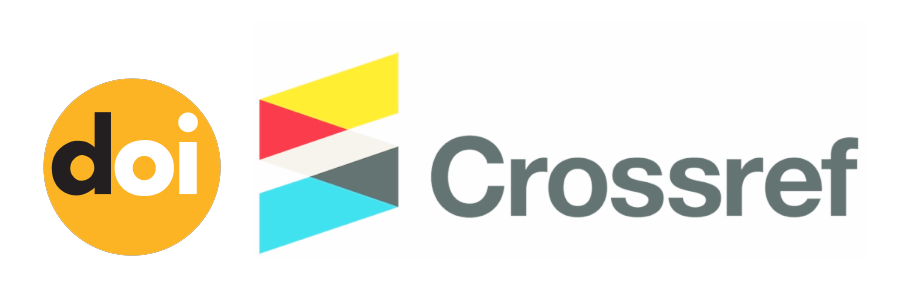Analysis of Students' Problem-Solving Skills in Physics Learning Through a STEM-Oriented Direct Teaching Model
Abstract
Problem-solving skills are one of the 21st-century skills that students must master, but most students still have not mastered them. This research aims to describe the implementation and obstacles to implementing STEM-oriented direct instruction to improve students' problem-solving skills. This research is descriptive and qualitative in analyzing students' problem-solving skills. The subjects of this research were 20 students in class XI MIPA. The tools used are sound wave teaching materials that have been validated, and research instruments are student response questionnaires, and researchers act directly as teachers. Data analysis is carried out by reviewing the results obtained in the field through interviews, observations, and a collection of other documents. The data analysis stages in this research used the Miles and Huberman model: data classification, data display, and data validation. It was concluded that the implementation of learning took place according to the STEM-oriented direct instruction syntax, and several factors hindered the improvement of students' problem-solving skills, including internal factors, namely from within the students, and external factors, namely from the teacher and school.
Keywords
Full Text:
PDFReferences
Arends, R. (2012). Learning to teach: Belajar untuk mengajar. Pustaka Pelajar.
Arikunto, S. (2012). Prosedur penelitian suatu pendekatan praktek. In Paper Knowledge . Toward a Media History of Documents: Vol. Kelimabela. Rineka Cipta.
Azizah, R., Yuliati, L., & Latifah, E. (2015). The physic problem solving difficulties on high school student. Jurnal Penelitian Fisika Dan Aplikasinya, 5(2), 44–50.
Bano, M., Zowghi, D., Kearney, M., Schuck, S., & Aubusson, P. (2018). Mobile Learning for Science and Mathematics School Education: A Systematic Review of Empirical Evidence. 121, 30–58.
Becker, K., & Park, K. (2011). Effects of integrative approaches among science, technology, engineering, and mathematics (STEM) subjects on students’ learning : A preliminary meta-analysis. Journal of STEM Education, 12(5), 23–38.
Citra, K. A., Nehru, N., Pujaningsih, F. B., & Riantoni, C. (2021). Keterampilan pemecahan masalah siswa pada materi listrik arus searah di masa pjj. Jurnal Pendidikan Fisika Dan Teknologi, 7(2), 75–79. https://doi.org/10.29303/jpft.v7i2.2663
Dewanti, S. S., Kartowagiran, B., Jailani, J., & Retnawati, H. (2020). Lecturers’ experience in assessing 21st-century mathematics competency in indonesia. Problems of Education in the 21st century, 78(4), 500–515.
Erlinawati, C. E., Bektiarso, S., & Maryani. (2019). Model pembelajaran project based learning berbasis stem pada pembelajaran fisika. Seminar Nasional Pendidikan Fisika, 4(1), 1–4.
Fortus, D. (2005). Design based science and real world problem solving. International Journal of Science Education, 27(7), 855–879.
Franestian, I. D., Suyanta, & Wiyono, A. (2020). Analysis problem solving skills of student in Junior High School. Journal of Physics: Conference Series, 1440(1), 012089. https://doi.org/10.1088/1742-6596/1440/1/012089
Heriyanti, A., & Gumay, O. P. U. (2018). Penerapan model direct intruction pada pembelajarn fisika. Science and Phsics Education Journal, 30–35.
Ince, E. (2019). Implementation and results of a new problem solving approach in physics teaching. Momentum: Physics Education Journal, 58–68. https://doi.org/10.21067/mpej.v3i2.3396
Jayusman, I., & Shavab, O. A. K. (2020). Studi deskriptif kuantitatif tentang aktivitas belajar mahasiswa dengan menggunakan media pembelajaran edmodo dalam pembelajaran sejarah. Jurnal Artefak, 7(1), 13–20.
Lin, S., Zhou, Y., & Wijaya, T. T. (2020). Using hawgent dynamic mathematics software in teaching arithmetic operation. International Journal of Education and Learning, 2(1), 25–31.
Maisarah, S. (2022). Pengembangan perangkat autonomy based stem learning pada materi gelombang bunyi untuk meningkatkan literasi digital peserta didik. Universitas Lambung Mangkurat.
Makiyah, Y. S., Mahmudah, I. R., Sulistyaningsih, D., & Susanti, E. (2021). Hubungan keterampilan komunikasi abad 21 dan keterampilan pemecahan masalah mahasiswa pendidikan fisika. Journal of Teaching and Learning Physics, 6(1), 1–10. https://doi.org/10.15575/jotalp.v6i1.9412
Mashrukhin. (2010). Metode penelitian pendidikan dan kebijakan. Prenada Media Grup: Jakarta.
Novikov, A. M., & Novikov, D. A. (2013). Research methodology : From philosophy of science to research design. Taylor & Francis Group, LLC.
Ogunleye, A. O. (2009). Teachers and students perceptions of students problem-solving difficulties in physics: implications for remediation. Journal of College Teaching & Learning (TLC), 6(7), 85–90. https://doi.org/10.19030/tlc.v6i7.1129
Olivares, V., & Ceglie, R. J. (2020). The intergenerational transmission of mathematics attitudes. International Journal of Education in Mathematics, Science and Technology (IJEMST), 8(2), 76–91. https://doi.org/https://doi.org/10.46328/ijemst.v8i2.741
Rasyid, H., Haris, A., & Khaeruddin, K. (2013). Meningkatkan hasil belajar fisika melalui model pembelajaran kooperatif tipe stad (student teams achievement divisions). Jurnal Pendidikan Fisika. https://journal.unismuh.ac.id/index.php/jpf/article/view/198
Reddy, M. V. B., & Panacharoensawad, B. (2017). Students problem-solving difficulties and implications in physics: an empirical study on influencing factors. Journal of Education and Practice, 8(14), 59–62. www.iiste.org
Saputra, Y. D., Fahrezi, I. A., Faisal, M., Dinata, S. A. W., Salim, R., & ... (2022). Pembinaan siswa sma di balikpapan untuk menghadapi kompetisi sains nasional 2021 bidang fisika. JABN. http://jabn.upnjatim.ac.id/index.php/jabn/article/view/92
Shirish, T. S. (2014). Research Methodology in Education. Lulu Publication.
Siswanto, J., Susantini, E., & Jatmiko, B. (2017). Kendala-kendala pembelajaran multi representasi berbasis investigation dalam pembelejaran fisika. Jurnal Penelitian Pembelajaran Fisika, 8(1), 39–43. https://doi.org/10.26877/jp2f.v8i1.1335
Siswanto, J., Suyidno, S., Mahtari, S., Fitriyani, Febriani, W., & Sari, E. (2023). The barriers to developing students’ scientific literacy in learning physics of quantities and measurements. Jurnal Pendidikan Sains Indonesia, 11(2), 206–220.
https://doi.org/doi.org/10.24815/jpsi.v10i4.27767
Suyidno, Haryandi, S., & Sunarti, T. (2021). Pembelajaran kreatif berbasis otonomi. Lambung Mangkurat University Press.
Suyidno, S., Mahtari, S., & Siswanto, J. (2021). Autonomy based stem learning.
Upagade, V., & Shende, A. (2010). Research methodology. S. Chand & Company PVT. LTD.
Wardoyo, C., Satrio, Y. D., & Ratnasari, D. A. (2020). Analysis of teacher’s pedagogical and professional competencies in the 2013 curriculum with the 2017-2018 revision in accounting subject. REiD (Research and Evaluation in Education), 6(2), 142–149.
DOI: https://doi.org/10.20527/jipf.v8i1.10878
Refbacks
- There are currently no refbacks.
Indexed by: Jurnal Ilmiah Pendidikan Fisika is licensed under a creative commons attribution-share alike 4.0 international license
Statistics Counter |
















